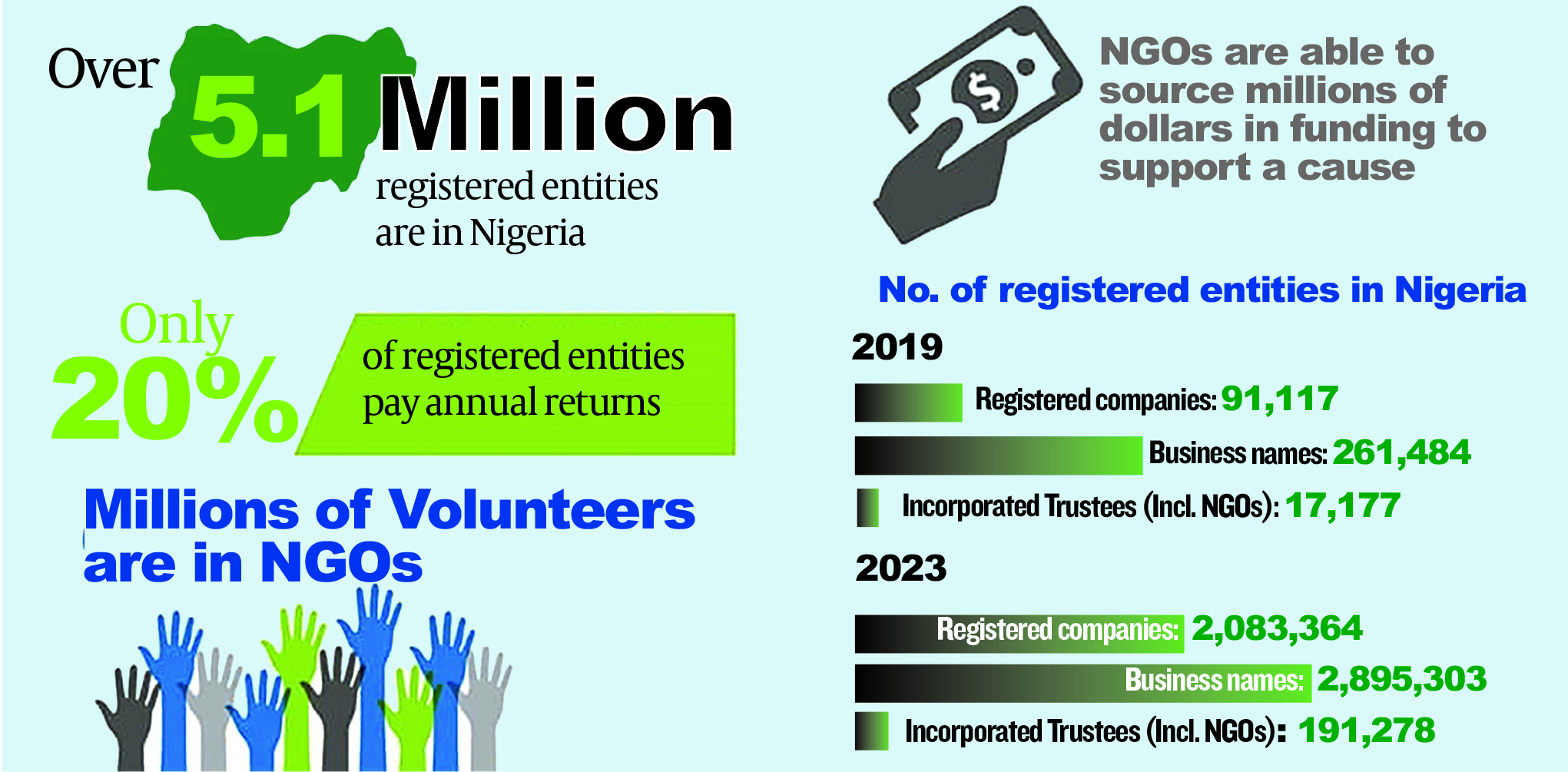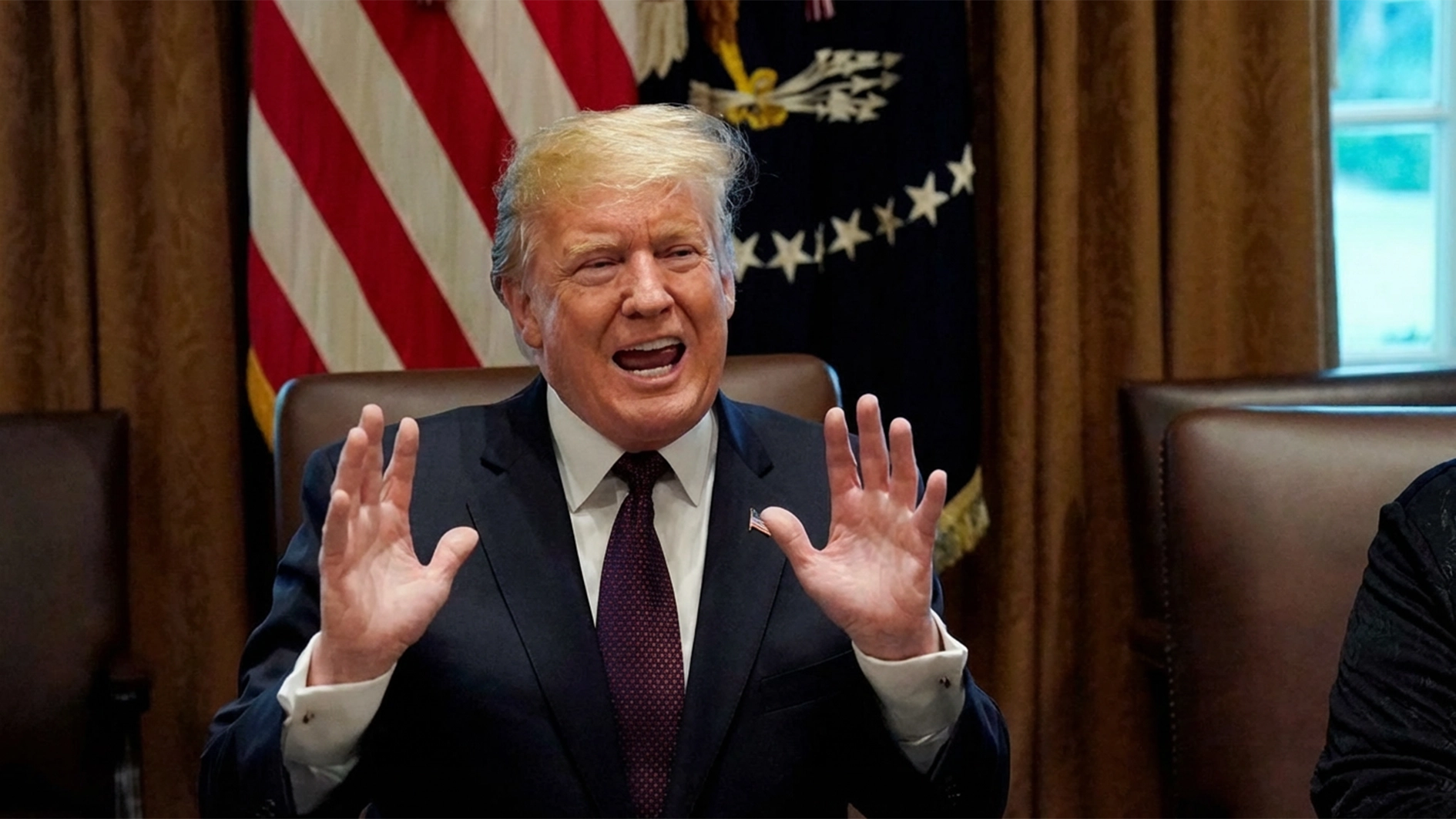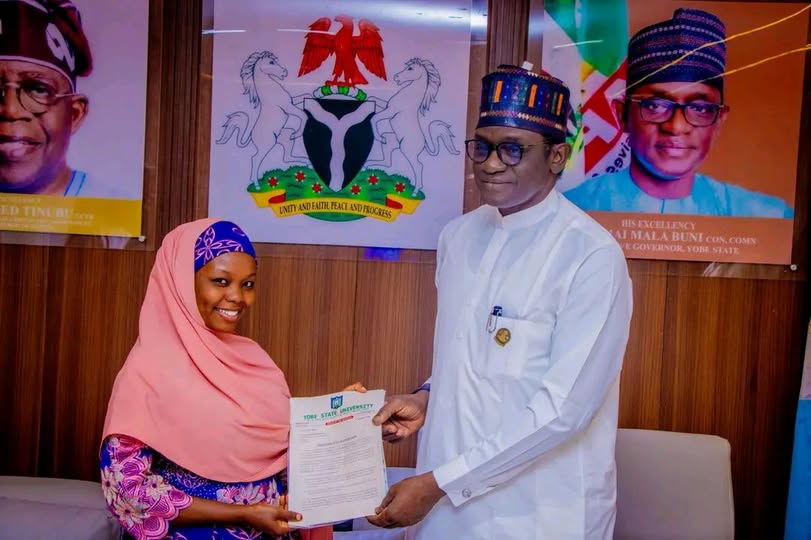 • CSOs blame politicians, govt officials for surge in NGOs
• CSOs blame politicians, govt officials for surge in NGOs
• Number of registered business names hits 2,895,303, while NGOs stood at 191,278
• Total entities in 2023 amounts to 5,169,945
• Incorporated Trustees rose to 191,278, up by 1,014% from 17,177 in 2019
• Lawson: NGOs should be allowed to regulate themselves
Powered by mission-driven people who are passionate about making a difference in their communities, Nigeria’s nonprofit sector has grown by over 1,000 per cent amid concerns about the motivation and unlikely activities of nonprofit firms being used by political-exposed people to challenge the rule of law.
Fuelled by passion, optimism and the need for intervention on certain social issues, the necessity of not-for-profit agencies cannot be ignored, however, the sudden spike in their numbers remains a concern for stakeholders who state that the crowded field has increased the quest for funding and redefined purpose of many of these firms who are becoming tools in the hands of politicians for protests.
Already, the effort of the National Assembly to enact a law to regulate the activities of Non-Governmental Organisations (NGOs), referred to as Incorporated Trustees and check their proliferation, like previous attempts, is facing stiff opposition.
This is because Civil Society Organisations (CSOs) have always suspected the move was a ploy by the government to gag civil movements and clamp down on dissent.
But the big question has always been what value the plethora of NGOs add to the national or subnational economy in comparison to companies and business names that pay taxes.
To understand the rate at which the proliferation occurred, The Guardian took a four-year survey of the figures between 2019 and 2023.
The total entities in Nigeria as of May 2019 were 369,778. The breakdown showed 17,177 registered NGOs, 91,117 Companies and 261,484 business names.
However, as of November 2023, the total number of entities ballooned to 5,169,945. The breakdown showed that companies were 2,083,364, business names were 2,895,303, and NGOs stood at 191,278.
The Guardian obtained these figures from the Corporate Affairs Commission (CAC).
Therefore, between 2019 and 2023, the figure for NGOs rose by 174,101, representing a 1,014 per cent increase.
With the frequency at which entities are registered daily in Nigeria, especially with the Companies and Allied Matters Act (CAMA) 2020 providing that an individual can register a company, there are speculations that the number will surge in the coming years.
The then acting Registrar General of the Commission, Lady Azuka Azinge while speaking at a customer forum held in Abuja, disclosed that a total of 618,309 business entities were registered by the commission from 2016 to 2018.
She said a total of 175,000 entities were registered in 2016, while 193,194 were registered in 2017 and 252,035 in 2018.
She further stated that 248,914 were limited liability companies, and 327,676 business names, while 41,719 were incorporated trustees.
In the past, there have been several attempts to regulate NGOs, and a good number of civil society organisations have also mounted strong opposition against it.
While some existing laws regulate NGOs such as the Financial Reporting Council Code for Not-for-Profits Organisations (NFPO) 2016, which ‘prevents’ a founder or leader of a mosque, church or civil society organisation from heading the organisation after 20 years, some believe stronger legislation is needed to rein in some of those organisations that have reportedly become conduit for either money laundering or avenue of attracting foreign grants for the sole benefit of their promoters.
Still gathering dust at the National Assembly is the NFPO Code of Governance Bill 2014, which is the NGO bill that provides for the NGO Commission.
Also in 2021, the controversial NGO regulations bill was presented before the House of Representatives.
The bill, sponsored by Sada Soli (APC, Katsina), sought to establish the legislative framework to regulate the activities of NGOs and Civil Society Organisations (CSOs).
Similarly, in 2017, Buba Jubrin sponsored a bill that sought to regulate NGOs and CSOs.
The bill passed a second reading at the House and was subsequently referred to the Committee on Civil Society Organisations and Development Partners.
On the day of its public hearing, scores of protesters marched to the National Assembly asking that the bill be dropped.
The committee after the public hearing did not present its report to the lawmakers for consideration, thereby ending the move.
Although some of the NGOs often collaborate with government agencies, international organisations, and local communities with regard to their various mandates, the impact of many others has been called into question.
What impact are these NGOs making in line with their enabling mandates, compared to Limited companies that are strictly regulated?
Notwithstanding the perceived drawbacks, some notable NGOs have made remarkable achievements in discharging their mandates like getting justice for women and children as well as holding the government and its institutions accountable.
Groups such as Policy and Legal Advocacy Centre (PLAC), Social Economic Rights and Accountability Project (SERAP), Legal Defence and Assistance Project (LEDAP), Women Advocates Research and Documentation Centre (WARDC), Access to Justice (A2J), Open Society Initiative for West Africa (OSIWA), Prisoners’ Rehabilitation and Welfare Action (PRAWA), Human Rights Writers Association of Nigeria (HURIWA) and many others have addressed wide range of issues concerning corruption, challenging government on accountability, women’s rights and domestic violence in particular, including social conflicts in the society.
They have also fought overwhelming patriarchal power relations that disempower women economically, socially, politically and domestically and which reinforce violence against women and other gender-related violations.
Some of them sponsor bills in state legislatures as well as federal level and help to promote capacity, plug leakages and defend against human rights abuses.
Others provide a conducive forum for dialogue, ideas and attitudinal change.
Speaking on the need for stricter regulation, the vice chairman of the Joint Action Force (JAF), Achike Chude said the government and politicians are responsible for the proliferation of NGOs.
He said many NGOs exist today not for the good of society, but for money-making ventures.
He agreed that NGOs need stricter regulation but disagreed that the government should spearhead it.
“If the government should lead such regulation, it would use the avenue to haunt those genuine NGOs that have stood as torn in their flesh,” he said.
According to him, genuine civil society leaders should be saddled with the responsibility of regulating the NGOs.
He added that contrary to what people think, “it is near impossible to get funds from an international body and not use it in line with what it is meant for. Most of the crimes NGOs commit are perpetrated by the unregistered ones and those created by politicians for ulterior purposes.”
A member of the Civil Liberties Organisation (CLO), Femi Lawson said it would be worse to allow the government to regulate NGOs.
“The NGOs should rather be allowed to regulate themselves and fish out the bad ones. The bad NGOs are not difficult to identify but the challenge is that the government itself is the brain behind the shenanigans happening to NGOs today,” he claimed.
Lawson recalled how NGOs multiplied in number during the Olusegun Obasanjo administration, saying, “Politicians have now perfected the use of NGOs to their selfish political interest.”
On the issue of tax payment, another member of the civil society body, Mr. Wale Adeoye said it was a wrong assertion to say NGOs are exempted from tax.
“Go and look at the law establishing NGOs. It is not true that NGOs are easy money ventures as people are thinking. To get funds from an international organisation requires a lot of procedures,” he pointed out.
Adeoye noted that one of the challenges in regulating NGOs is the Constitution. “As long as the Constitution guarantees freedom of association, it is very difficult to stop people from forming NGOs,” he declared.






